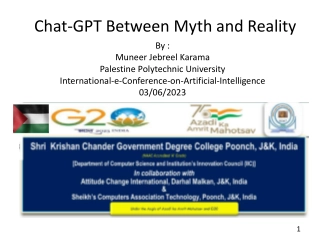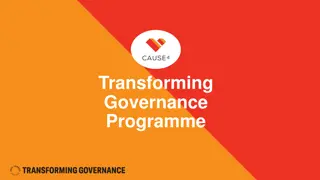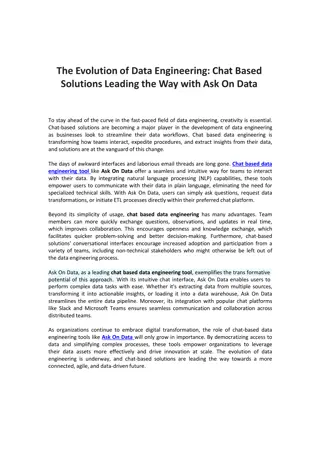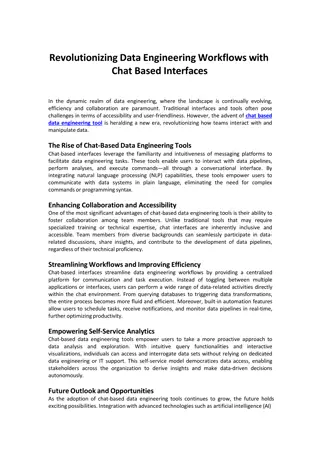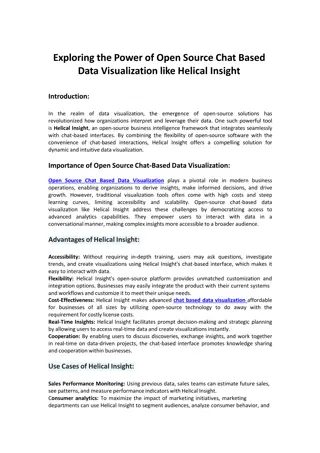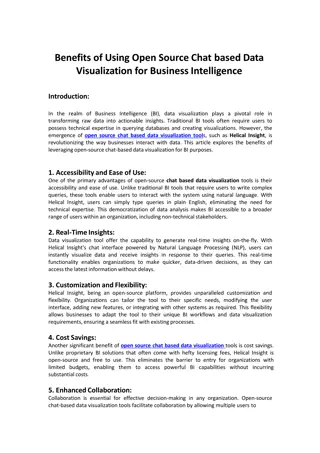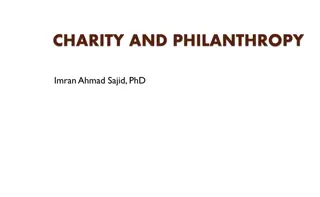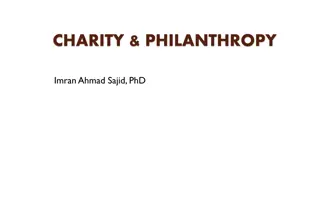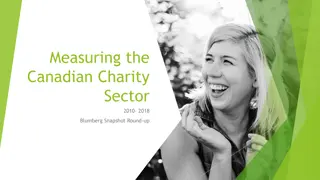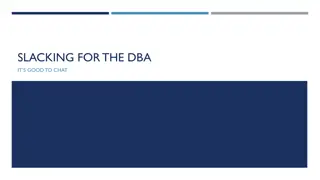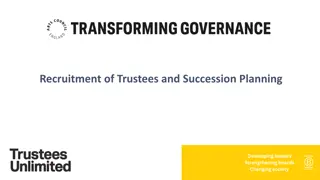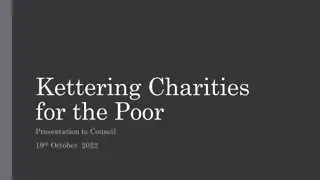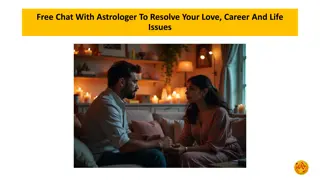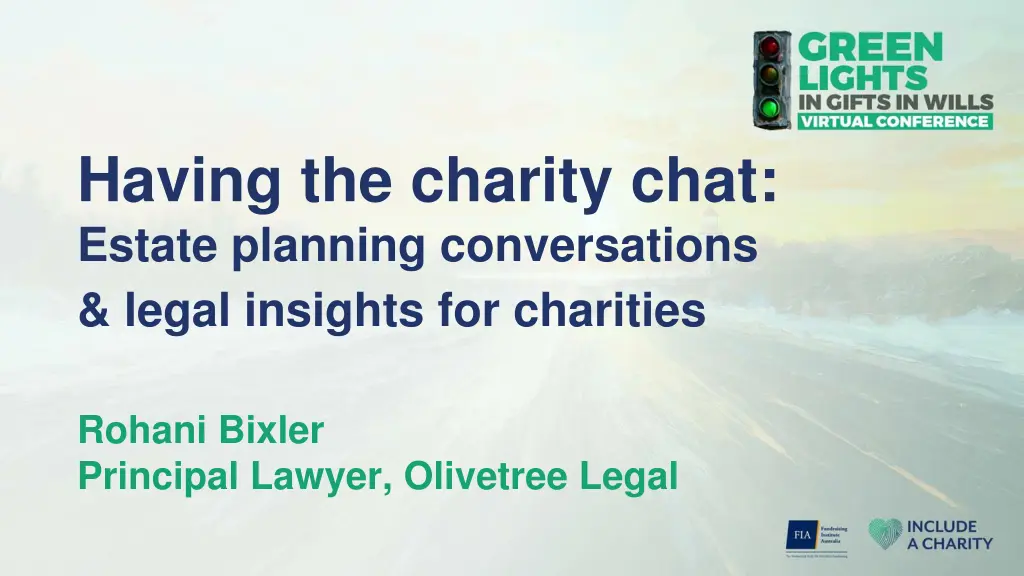
Charity Chat: Estate Planning Conversations and Legal Insights
Explore the nuances of estate planning for charities through engaging conversations and legal insights. Discover the impact of personal connections in bequests, choosing charitable organizations, and selecting purposes for gifts. Ensure clarity in selecting organizations and safeguarding your charitable intentions for the future.
Download Presentation

Please find below an Image/Link to download the presentation.
The content on the website is provided AS IS for your information and personal use only. It may not be sold, licensed, or shared on other websites without obtaining consent from the author. If you encounter any issues during the download, it is possible that the publisher has removed the file from their server.
You are allowed to download the files provided on this website for personal or commercial use, subject to the condition that they are used lawfully. All files are the property of their respective owners.
The content on the website is provided AS IS for your information and personal use only. It may not be sold, licensed, or shared on other websites without obtaining consent from the author.
E N D
Presentation Transcript
Having the charity chat: Estate planning conversations & legal insights for charities Rohani Bixler Principal Lawyer, Olivetree Legal
The Conversation a) Exploring the Options Are there any charities you would like to benefit? (Are there charitable causes you would like to support?) I haven t thought about it
The Conversation It s a No Brad was single and in his 30s. He had lost both parents and had inherited substantial wealth. He initially chose to benefit charities in his Will because there s no-one else . Subsequently he altered the Will to create the Aspen Fund electing to bear the full cost of an annual trip for a select group of friends to ski in Aspen in his memory. This had personal connection for him. - Family members - No personal connection - Not my responsibility - Mistrust of charities - Not enough to matter
The Conversation I haven t thought about it Most common bequests have a story more likely to stick if there s a personal connection. Discussing any stories eg. Have they lost a loved one to a particular illness? Do they have a family member with a disability? Has an animal, sport or performing arts played a significant role in their life? Miranda lost her battle with cancer shortly after she got married. With no children, her devastated husband wanted to create a legacy. She had loved the performing arts and had gotten her first break in directing with a small theatre group. Her husband established a scholarship with the theatre group supporting an assistant director scholarship for youth who had not had any previous opportunities. The scholarship was $1000 per annum. It has given many young people their first break and has kept Miranda s memory alive as they learn about her through the application process.
The Conversation It s a Yes Selecting an organization: - Make sure the details are EASY to find! It may seem obvious that the proper name and ABN should be accessible but many are not. - The donor will use the common name (eg St Vincents). Lost Gifts : difficult to identify; given to the wrong organisation
The Conversation It s a Yes Selecting a purpose - Too many charities to choose from - Uncertain whether a charity I like now will still be managed well in the future - What if a charity is deregistered or the gift fails Gift in Wills page may want to include some sample wording for a purpose gift. eg one or more charitable organisations in Australia for the purpose of XX , such organization(s) selected by my Executor and I would like my Executor to consider NFP A as a potential recipient of the donation, provided that the receipt of an authorized representative of the organization shall be sufficient discharge to my Executor of his/her duties.
Make the gift known Charitable recipient Executor Other beneficiaries Lodge the Will with the Supreme Court Managing expectations can assist with smoother administration Work with Executor to develop relationship and ensure they are aware you know about the bequest Promote a notification system for Wills lodged with the Court Is there a charitable beneficiary? This would make it easy for Charities / Bequest Assist to search
I want to leave a bequest but I might change my mind People change their Wills regardless of the beneficiaries. Even with family members, Wills change over time. Most of our charitable donors have changed over time. More likely to retain gifts to organisations they have had positive outcomes. They are doing X, Y and Z .
I want to leave a bequest but I think my family members may challenge the Will Work with a lawyer to consider options to keep assets out of the Estate (not NSW) Ensure family members and the Executor understand and ideally are engaged pre- death
Mitigating Challenges Structure In some situations, a challenge is foreseeable. The donor may wish to establish a structure during lifetime to ensure the bequest occurs (more difficult in NSW). eg. Doug wanted to benefit a local church and model train club. He was concerned his daughter would challenge the Will. He had sold his house and was entering aged care. He established a trust and contributed the house proceeds into the trust. The trust benefited Doug for his lifetime and passed to the church and model train club on his death. This passed outside the Will and was not susceptible to a claim.
Saving Face in Challenging Times Demonstrating an ongoing relationship with the testator during lifetime can be helpful If possible, create a collaborative relationship with the Executor If the Executor is not sympathetic are there other charitable beneficiaries? Is it possible to band together to avoid duplicity of legal fees? In some cases, this may not be possible eg multiple Wills benefiting different charities and a question of which is valid.
Saving Face in Challenging Times When a Will is challenged: 1. The law is supposed to operate to protect the principle of Freedom of Testation 2. It is rare for a Court to entirely remove a gift provided in a Will 3. The Executor should act in the interest of the beneficiaries named in the Will (including Charities) 4. The Will should be changed to the minimal extent required to reasonably meet the financial need of a person to whom the testator owed a moral obligation (the plaintiff) * Charities can risk reputational damage if they overspend on legal fees defending their position (both publicly and with the legal industry)
Ongoing reform - Bequest Assist research re lost gifts: Reform in the Probate system to alert charities (potentially all beneficiaries) - State-based processes; may be different between States - Allow for superannuation binding nominations to include charities as beneficiaries - Overall promotion of gifts in Wills: Australia is one of the lowest ranked Western countries for charitable giving.

